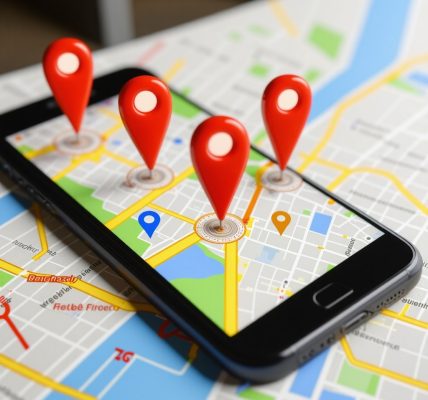Introduction to Google Maps SEO Strategies
In today’s digital landscape, local businesses need to leverage every tool available to enhance their visibility and attract more customers. One of the most effective ways to achieve this is through Google Maps SEO strategies. Optimizing your business presence on Google Maps not only increases your visibility but also drives foot traffic to your physical location, making it an essential component of local search engine optimization.
Understanding the Importance of Google Maps SEO
Google Maps has become a cornerstone for consumers searching for nearby services. When a potential customer searches for a product or service, they often turn to Google Maps to find businesses in their vicinity. This makes it critical for local businesses to employ effective local SEO strategies that enhance their Google Maps listing.
Why Google Maps Optimization Matters
Optimizing your Google Maps listing can lead to increased engagement and higher conversion rates. Here’s why:
- Enhanced Visibility: A well-optimized listing appears prominently in search results, ensuring that potential customers can easily find your business.
- Increased Trust: Customers are more likely to trust businesses with complete and accurate information on Google Maps.
- Improved User Experience: When users find relevant information quickly, they are more likely to visit your location.
Core Strategies for Google Maps SEO
Implementing effective Google Maps SEO strategies involves several key steps. Here are the core tactics to consider:
1. Claim and Verify Your Google Business Profile
The first step in optimizing your Google Maps presence is to claim and verify your Google Business profile. This process ensures that you have control over the information displayed about your business. Make sure to provide accurate and up-to-date details, including your business name, address, phone number, and operating hours.
2. Optimize Business Information
Once your profile is claimed, focus on optimizing your business information. Use relevant keywords in your business description to enhance visibility. For instance, if you run a pizza shop, include terms like “best pizza in [your city]” to attract local customers searching for dining options.
3. Leverage Google Posts
Utilizing Google Posts is another effective strategy. Regular updates about special offers, events, or new products keep your audience engaged and encourage them to visit your business. This not only informs your customers but also signals to Google that your business is active and relevant.
4. Encourage Customer Reviews
Customer reviews play a crucial role in your Google Maps SEO strategy. Positive reviews enhance your credibility and improve your ranking in local search results. Encourage satisfied customers to leave reviews and respond to them promptly to show that you value their feedback. Implementing effective GMB review generation strategies can significantly impact your local visibility.
5. Use High-Quality Images
Adding high-quality images to your Google Business profile can greatly enhance your appeal. Images of your products, services, and storefront help potential customers get a feel for your business, making them more likely to visit. Regularly update your images to keep your profile fresh and engaging.
6. Monitor and Analyze Performance
Finally, it’s essential to monitor your Google Maps performance. Use analytics tools to track how well your listing is doing. Understanding how customers find your business and what actions they take can help refine your strategies.
Utilizing Local Keywords Effectively
Incorporating local keywords into your Google Maps SEO strategies is vital for attracting the right audience. These keywords should reflect the services you offer along with your location. For instance, if you’re a coffee shop in Seattle, using phrases like “best coffee Seattle” or “Seattle coffee shop” can significantly boost your visibility in local searches. Implementing these keywords in your business description and posts can help search engines understand your relevance to local queries.
Geo-Targeting in Content
Geo-targeting is an effective way to enhance your Google Maps presence. By tailoring content specifically for your local audience, you can increase engagement and drive more traffic. Create blog posts that highlight local events, promotions, or collaborations with other local businesses. This not only showcases your involvement in the community but also strengthens your local SEO. For more detailed insights on local SEO strategies, check out Proven Local SEO Strategies for Small Business Success.
Build Local Backlinks
Another crucial aspect of Google Maps SEO is building local backlinks. Establish partnerships with other local businesses, sponsors, or community organizations to create backlinks to your Google Business Profile. These backlinks signal to search engines that your business is a credible source within the local community. Additionally, participating in local events and getting featured in local news can further enhance your backlink profile, leading to improved rankings.
Maximizing Google Maps Engagement
Engagement on Google Maps is a two-way street. Not only should you focus on attracting customers, but also on engaging with them. Responding to reviews, answering questions, and updating your business information promptly can improve your customer relationships and boost your SEO rankings. Google prioritizes businesses that actively engage with their clientele, so maintaining an active presence is essential. For effective review generation strategies, consider visiting Effective GMB Review Generation Strategies for Growth.
Utilizing FAQs to Enhance User Experience
Adding a Frequently Asked Questions (FAQ) section to your Google Business Profile can significantly enhance user experience. Address common customer queries about your services, hours, and policies in a clear and concise manner. This not only helps potential customers find the information they need quickly but also reduces the workload on your customer service team. Additionally, FAQs can include keywords that improve your local search visibility.
Leveraging Social Media for Google Maps SEO
Integrating your social media efforts with your Google Maps SEO strategy can create a synergistic effect. Share your Google Business Profile on your social media channels, encouraging your followers to check in, leave reviews, and share their experiences. This cross-promotion increases your visibility and can drive more traffic to your Google Maps listing. For more insights on how to utilize Google Posts effectively, refer to How to Use GMB Posts for Engaging Local SEO Content.
Monitoring Your SEO Efforts
Lastly, regularly monitoring your SEO efforts is crucial for ongoing success. Utilize tools like Google Analytics and Google My Business Insights to track how customers are interacting with your Google Maps listing. Pay attention to metrics such as the number of views, search queries, and customer actions like calls or direction requests. This data can guide your future SEO strategies, enabling you to refine your approach for better results.
Enhancing Local Engagement through Google Maps SEO Techniques
To truly excel in Google Maps SEO, businesses must enhance local engagement. Engaging with your audience not only fosters customer loyalty but also strengthens your online presence. One effective way to achieve this is by utilizing local events and promotions in your marketing strategy. For example, hosting a community event or participating in local fairs can attract more visitors to your business and improve your visibility on Google Maps.
Creating Localized Content for Increased Relevance
Localized content creation is essential for improving your Google Maps ranking. This involves crafting blog posts, articles, or social media content that resonates with your local audience. Focus on subjects that highlight your involvement in the community or showcase local partnerships. By doing so, you can enhance your relevance and authority in the local market. For insights on how local SEO strategies can drive growth, check out Local SEO Services for Small Business: Proven Growth Tips.
Utilizing Google My Business Insights
Google My Business provides valuable insights that can help you understand customer behavior. By analyzing data such as customer actions, views, and search queries, you can make informed decisions about your marketing strategies. This information can guide you in optimizing your Google Maps listing and improving your overall local SEO performance. Regularly checking your GMB SEO audit can lead to actionable insights that boost your local search rankings.
Utilizing User-Generated Content for Authenticity
User-generated content (UGC) is a powerful tool for enhancing your Google Maps presence. Encourage your customers to share their experiences through photos and reviews. This not only adds authenticity to your business but also engages potential customers who are researching their options. For example, featuring customers’ photos on your social media or website can entice others to visit your location. Positive reviews and testimonials can significantly impact your credibility, so implementing effective review generation strategies is a must. For best practices, refer to GMB Review Generation Best Practices.
Optimizing for Voice Search in Local SEO
With the rise of voice-activated searches, optimizing for voice search is becoming increasingly important. Many users perform searches using natural language, often phrasing queries as questions. To optimize for these queries, focus on long-tail keywords and phrases that reflect how your customers might ask about your services. Incorporate these keywords into your content and Google Business Profile to improve your chances of appearing in voice search results.
Building a Strong Online Reputation
Your online reputation directly impacts your Google Maps SEO. Actively managing your online presence by responding to reviews and engaging with customers can boost your credibility and ranking. Addressing negative feedback promptly and professionally demonstrates your commitment to customer satisfaction, which can enhance your reputation. For more on managing reviews, explore Effective GMB Review Generation Strategies for Growth.
Leveraging Local Directories for Enhanced Visibility
Listing your business in local directories can improve your visibility and search rankings. Ensure your business is accurately represented across various platforms, including Yelp, Yellow Pages, and industry-specific directories. Consistent NAP (Name, Address, Phone Number) information across these listings is crucial for establishing trust and authority in your local area.
Wrapping Up Your Google Maps Strategy
To summarize, maximizing your Google Maps SEO involves a combination of engaging with your local audience, optimizing your online presence, and leveraging data to refine your strategies. By implementing these advanced techniques, you can ensure your business stands out in the competitive local market. As you continue to develop your Google Maps strategy, consider exploring further topics such as Fastest Ways to Rank Your Google Business Profile for additional insights and actionable tips.
Leveraging Google Maps SEO for Business Growth
As the digital landscape evolves, local businesses must adapt their strategies to remain competitive. Implementing advanced Google Maps SEO techniques can significantly enhance your visibility and drive more traffic to your storefront. The goal is to create a robust online presence that resonates with your local community.
Utilizing Insights for Continuous Improvement
One of the keys to successful Google Maps SEO is the effective use of insights provided by tools like Google My Business. Regularly reviewing these insights allows you to understand customer behavior, including what search queries led them to your profile and how they interacted with your listing. This valuable information can help refine your strategies to better meet the needs of your audience.
Engaging with Customers through Timely Updates
Keeping your Google Business Profile updated is vital for maintaining customer interest. Regularly post about new products, services, or promotions to keep your audience engaged. Utilize Google Posts to share timely updates that can encourage customers to visit your business. These posts not only inform but also contribute to your SEO efforts by signaling to Google that your business is active and relevant.
Building a Community Connection through Local Events
Participating in or sponsoring local events can greatly enhance your Google Maps presence. These activities allow you to engage with the community, build relationships, and create content that resonates with your local audience. Highlighting your involvement with community events through blog posts or social media updates can improve your relevance and authority in local searches.
Creating Quality Content Focused on Local Interests
Content marketing plays a pivotal role in Google Maps SEO. Crafting blog posts that discuss local events, trends, or community stories can drive traffic to your site and improve your local search visibility. This localized content establishes you as a trusted resource in your area, thereby enhancing your credibility.
Building Relationships with Local Influencers
Collaborating with local influencers can boost your online presence and provide valuable backlinks to your Google Business Profile. Influencers who align with your brand can help amplify your message, reaching a broader audience and driving more traffic to your business. This strategy not only enhances visibility but also builds community trust.
Optimizing Your Google Maps Listing with Local Keywords
Incorporating local keywords strategically throughout your Google Maps listing is essential for improving search rankings. Use terms that reflect your business and its location, such as “best [your service] in [city]”. These keywords should appear in your business description, posts, and responses to reviews to maximize your visibility and relevance in local search results.
Encouraging Customer Interaction with FAQ Sections
Adding a Frequently Asked Questions (FAQ) section to your Google Business Profile can enhance customer interaction. Addressing common inquiries not only helps potential customers but also provides an opportunity to include relevant keywords, improving your local SEO. Ensure that the information is clear and concise to facilitate quick access to answers.
Conclusion: Elevating Your Google Maps SEO Strategy
In conclusion, employing advanced Google Maps SEO techniques is crucial for local business success. By leveraging insights, engaging with your community, and optimizing your content with local keywords, you can significantly enhance your visibility on Google Maps. For further strategies on improving your local presence, explore Fastest Ways to Rank Your Google Business Profile for additional insights that will help you dominate local search results.
Comprehensive FAQ Section on Google Maps SEO
1. What is Google Maps SEO?
Google Maps SEO refers to the process of optimizing your business listing on Google Maps to improve its visibility in local search results. This includes optimizing your Google Business Profile, leveraging local keywords, and encouraging customer engagement through reviews and posts.
2. How do I optimize my Google Business Profile?
To optimize your Google Business Profile, ensure that all information is accurate and complete, including your business name, address, phone number, and operating hours. Use relevant keywords in your business description, add high-quality images, and regularly post updates to keep your audience engaged.
3. Why are customer reviews important for Google Maps SEO?
Customer reviews are crucial because they enhance your credibility and influence your ranking in local search results. Positive reviews can improve your visibility and attract more customers, while responding to reviews demonstrates that you value customer feedback.
4. How can I encourage customers to leave reviews?
Encouraging customers to leave reviews can be done by politely asking them after a purchase or service. You can also provide links to your Google Business Profile in follow-up emails or incentivize feedback through discounts or loyalty programs.
5. What role do local keywords play in Google Maps SEO?
Local keywords help search engines understand your business’s relevance to local search queries. Incorporating keywords related to your services and location in your business description, posts, and responses to reviews can significantly improve your visibility in local searches.
6. How often should I update my Google Business Profile?
Regular updates are essential for maintaining customer interest and improving SEO. Aim to update your profile with new posts at least once a week, and ensure that any changes to your business information are made promptly.
7. Can social media impact my Google Maps SEO?
Yes, integrating your social media efforts with your Google Maps SEO strategy can enhance your visibility. Sharing your Google Business Profile on social media and encouraging followers to engage with your business can drive more traffic to your listing.
8. What are some best practices for using Google Posts?
When using Google Posts, focus on sharing timely updates about promotions, events, or new products. Ensure your posts are visually appealing and include a clear call to action to encourage customer engagement.
9. How do I monitor the performance of my Google Maps listing?
You can monitor your Google Maps performance using tools like Google Analytics and Google My Business Insights. These tools provide valuable data on how customers find your listing and their interactions with it.
10. What is the importance of NAP consistency in local SEO?
NAP consistency (Name, Address, Phone Number) is vital because search engines use this information to verify your business’s legitimacy. Ensuring that your NAP is consistent across all online platforms, including local directories, helps build trust and authority in your local area.
Authority Resources for Google Maps SEO
To further enhance your knowledge and implementation of Google Maps SEO, consider referencing the following trusted resources:
- Moz Beginner’s Guide to SEO – A comprehensive resource on search engine optimization principles.
- Search Engine Journal’s Google My Business Guide – Detailed insights on optimizing your Google Business Profile.
- BrightLocal’s Local SEO Learning Center – Offers a wealth of resources and articles on local SEO strategies.
- Local U – A community of local SEO experts sharing their knowledge and best practices.
- Search Engine Watch – Provides news, tips, and insights on search engine marketing and optimization.
Conclusion: Elevating Your Google Maps SEO Strategy
In conclusion, implementing advanced Google Maps SEO techniques is essential for the success of local businesses. By leveraging insights, engaging with your community, and optimizing your content with local keywords, you can significantly enhance your visibility on Google Maps. Stay proactive in monitoring your performance and adapting your strategies to ensure you maintain a competitive edge in the local market.




I really appreciate how this post breaks down the specific strategies for enhancing visibility on Google Maps. One thing that resonates with me is the emphasis on having accurate and complete business information. I’ve managed a small coffee shop in Portland for over five years, and when I updated our Google Business Profile with correct operating hours and added high-quality images, I noticed a significant increase in foot traffic. It’s amazing how something as simple as showing a cozy image of our in-house pastries can draw in customers!
Additionally, I believe leveraging Google Posts is crucial. We started promoting our weekly events and special offers through these posts, and it has not only kept our existing customers engaged but also attracted new visitors. I also wonder if anyone has used local partnerships as described in this post? Collaborating with nearby businesses for cross-promotion seems like a great opportunity to boost visibility locally. Overall, this article highlights some powerful and actionable tactics, and I’m excited to implement even more of them!
Jonathan brings up a great point about local partnerships for cross-promotion. From my experience managing a boutique retail store in Asheville, I’ve found that collaborating with local businesses indeed amplifies Google Maps SEO efforts. For example, last year, we partnered with a nearby artisanal coffee shop for a joint event. Not only did we create local backlinks by featuring each other’s Google Business profiles on our websites and social channels, but we also drove significant foot traffic by promoting the event through Google Posts. This dual effort seemed to signal to Google that both businesses were active and relevant locally. Furthermore, the event encouraged customer engagement through reviews and photo shares, which enhanced authenticity and credibility. Incorporating localized content about the event in our blog also helped target geographically relevant keywords. However, coordinating such partnerships requires clear communication to ensure NAP consistency and aligned messaging. I’m curious, how do others approach establishing successful local partnerships for SEO? Have any retailers or service providers found particular strategies effective in maintaining ongoing collaborations that benefit their Google Maps presence?